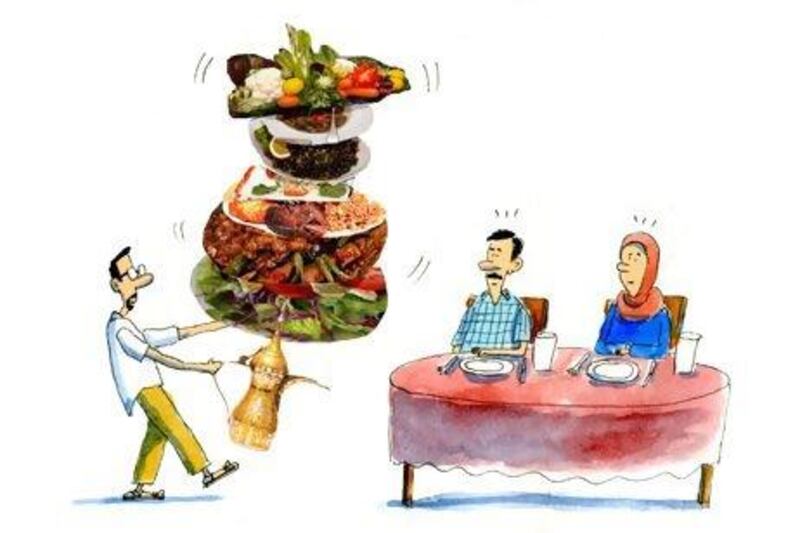We all like to be liked, don't we?
And we are good, generous people, aren't we?
I would think that, on average, yes, people do want to be perceived as likeable and successful - whatever their definition of success is - among their peers.
But I draw the line at needing to have a show of wealth vs actual possession of it. I am referring to what one gentleman, the head of a key institution in the UAE, said to me after a meeting about consumer behaviour, financial awareness, needing to live within our means and so on, who - as we were drawing to an end, very dramatically said to me: "But Nima. We Arabs are a very generous people. When we go shopping, our trolleys look like this" and he made the shape of a big triangle, in other words, trolleys overflowing with goods that are not necessary in order to "have" things and be "generous" when or if people drop in.
My belief is simple: yes please, let us all share what we have, think of others, and be sociable - but to be in debt as a result? Or take from Peter (a child of yours, for example - his or her education fund) to feed Paul (a visitor, relative or friend). No. I don't believe that's right.
Ramadan especially is a time for giving and generosity, but unfortunately, it is also a time of overindulgence and waste. It's estimated that at least 500 tonnes of food are thrown away every day in Abu Dhabi, and a whopping 1,850 tonnes in Dubai.
This in itself is sinful I believe. But couple it with living beyond the means to fund it, and it becomes plain crazy. And it's unsustainable too - on every level; whether it's the food that's chucked or the credit card payment that can only be serviced one minimum payment at a time because you couldn't be seen to be stingy, or less generous that the next person.
In neighbouring Saudi Arabia, there's said to be a 100 per cent increase in spending on food and other goods during the holy month. Couple that with recent data indicating that one in five UAE residents uses debt to pay off debt and you start to see an acutely worrying bigger picture taking shape.
We're missing the point. The point of Ramadan yes, but also of what life should be about, unless a never-ending cycle of debt is what you have in mind.
We should be living within our means. And that includes being generous within our means. If you can't afford it, don't do it. You can still be generous with many, many things, like your time, skills and abilities.
It's time to stop. Stop and think: why are you doing this? Is it peer pressure? Do you believe you'll be judged badly if you don't play host with the most?
I have a feeling that those who "offend" most (live beyond their means in order to "give" to others) are the very people who don't have their financial bases covered - such as adequate health insurance, life insurance, education funds. And so this fear of being mean and stingy - or being judged as such by others - means they are setting themselves up for a pauper's life later on, perhaps burdening their nearest and dearest, and most definitely being forced to watch the pennies when the status quo changes: jobs are lost, the pay is reduced or doesn't keep up with inflation, an accident, a child on the way.
The possibilities are many, and you cannot begin to predict or plan for them - other than by saving money, living within your means and being honest with yourself and all around you.
This doesn't always have to be about money changing hands.
I know of a barter system that exists among friends in the UK. Instead of paying money for a service rendered, they have the equivalent of an IOU. This can then be redeemed as a straightforward exchange of skills - eg the hairdresser cuts your hair in return for you painting her lounge - or it in turn can be exchanged for a different service - so that IOU is exchanged with a piano teacher who ends up having a hair cut. So you paint the lounge, get the hair cut IOU, give it to the piano teacher in return for a lesson and he gets his hair cut. Everybody's happy. And everyone's living within their means, sharing their skills and can be as generous as they want by giving more of their skill and time should they wish to do so.
Isn't it time for us to stop, look and listen to what money is doing to us - rather than for us?
Social "norms" need to be challenged every now and then. If we still believe that norm is what we want, then super. But think things through, work out the consequences of your actions and decide whether that's a price worth paying.
Nima Abu Wardeh is the founder of the personal finance website www.cashy.me. You can contact her at nima@cashy.me
Let's stop the madness and wise up on spending
Ramadan is a time for giving and generosity, but it is also a time of overindulgence. It is estimated that at least 500 tonnes of food are thrown away every day in Abu Dhabi, and 1,850 tonnes in Dubai. This in itself is sinful.

Editor's picks
More from the national




